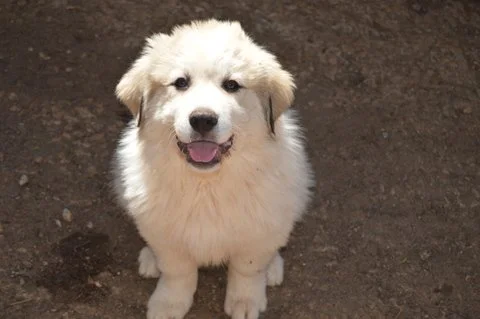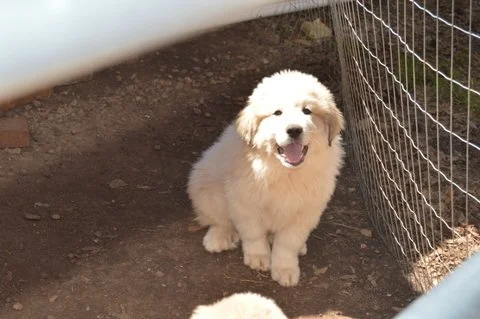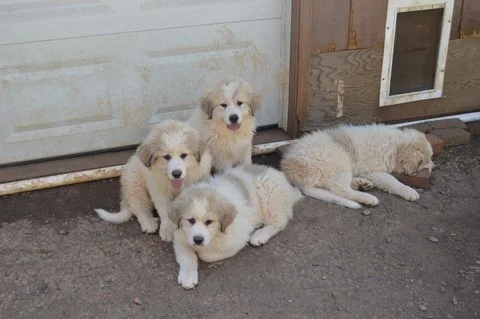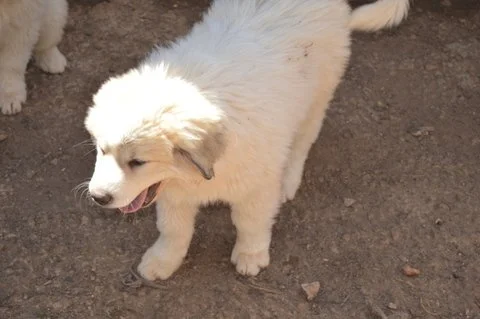Caring for your Great Pyrenees
The day has come and the family is so excited to have their new ball of fluff!! The Great Pyrenees puppies are simply ADORABLE balls of sweetness! Your Pyrenees puppy will generally be approx. 15 pounds when they leave us and be ready for their new family. Your puppy has been using a doggie door for several weeks before heading to their new home. If you have a doggie door or can install one, great! If not, your pup certainly understands upon leaving that the outdoors is the place they want to use the potty.
Feeding your new puppy
Your new puppy is very much an infant that has been getting all of his/her nourishment from mom and human grade hard food. Just like anything else, you get from your puppy what you put in. I'm a HUGE believer of feeding only the best of the best. Your puppy needs the best nourishment that you can give him/her. DO NOT CHANGE FOODS FOR YOUR PUPPY UNTIL THEY ARE AT LEAST 9 MONTHS OLD(or up to a year). Changing foods that your puppy is eating will upset their stomach and give them diarrhea which is VERY serious for a puppy. Also, if you change foods, you need to do it very gradually or they will develop gastrointestinal issues. We also believe that a diet of 100% soft food is a big disservice to your pup's dental hygiene. Hard food makes them crunch and helps clean teeth . Doing this together with things to chew such as cow hoofs really help keep teeth beautiful and white...and no bad breath! At MLGP, we feed only ' Beaverdam' brand hard food.. our adults eat the 'Beaverdam' food as well. There are other great foods out there also like the Wellness products and Solid Gold products. The point here is that supermarket dog foods or even foods like IAMS or Eukanuba are NOT quality foods. Read the labels and compare.
The website for the food that we use is www.beaverdampetfood.com
The puppy food that we use is called Beaverdam Puppy/Adult High Energy.
Feeding schedule for your puppy
Your new puppy needs to be fed four times per day initially(based on your schedule). At MLGP, we let the puppies graze continuously through the day. However, if you prefer a schedule for your puppy, until the puppy reaches 6 months old, feed four times per day and then reduce to 3 times per day. At the year mark, you can reduce to feeding twice per day in the morning and at night. We would recommend continuing with this schedule for the remainder of their life. Great Pyrenees puppies grow very slowly so we do not recommend limiting your puppy's intake at any meal unless your veterinarian says they are getting overweight. An overweight Great Pyrenees is NOT healthy since there is very slow growth and a large frame that needs to be kept from being overtaxed!
Table food and puppies
All we're going to say is NEVER. If you want your puppy to have a case of the poops like you've never seen before, then go ahead. Your puppy will be in pain and so will you while you are cleaning up what's been produced from the table scraps. Puppies should never taste a morsel of table food until they are 6 months old. This will totally upset their fragile stomachs and cause diarrhea.
Water
Obvious, but we're going to say it anyhow---Always have fresh clean water available- even at bedtime. You never want your puppy getting dehydrated. Dehydration is very serious and can lead to death--this is why diarrhea is very serious because it causes dehydration.
Toys!!
All puppies need toys of all kinds. Soft toys and squeaky toys and balls and bones. The more that you teach your puppy that the toys belong to him and to chew on bones and soft toys, the less chewing on other stuff that they will do. Always try to train your puppy that the toys and bones and squeaks are his and the shoes and furniture is yours. This has worked very well for us and we've not had any issues with lost items. Keep in mind that toys can be VERY dangerous ---such as eating plastic pieces or eating stuffing. When you are supervising, your pup can have any toy available. However, when you are NOT supervising, please only leave your puppy with things that cannot be eaten or ripped up causing potential bowel obstruction or choking hazards. Safe chews include natural cow bones, natural cow hooves, Deer antlers or anything that will not become mushy (ie rawhide, bully sticks, squeeky toys, things with stuffing). Keep your puppy safe---He/She is just a baby that does not understand that fun toys could be harmful.
Treats
Treats are great and deserved for excellent training and behavior! Very soft liver treats that can be broken into teey pieces work well. Tiny milk bone type treats are wonderful and we've also found that they make teeny sized baked pepperidge farm goldfish. A few of these work wonders while training or rewarding for good potty behavior. Not too many though --treats are treats and food is food.
Collar and Leash training
Initially, the rule of thumb here is that your puppy has never been on a leash and doesn't understand what a collar is. Thus, patience is in order. The first several times you try to walk your puppy you might get a bit of resistance and brattiness. A harness is a great idea initially while the puppy learns about walking on a leash. We recommend a nice soft harness such as a 'puppia' harness and using a leash that is not too long so your puppy won't be able to get too far from your side. Retractable harnesses are dangerous! Some people love them but, when you need to get to your puppy fast in a dangerous situation, there is nothing worse than trying to draw in a retracting rope---AND, they break!
Veterinary care and disease
Your puppy is going to need several rounds of puppy shots for all kinds of diseases. The reason why your puppy will have several 'rounds' of shots at your veterinarian is to 'boost his/her immune system'. This will keep him/her healthy. You will receive your puppy from MLGP de-wormed and with the first round of canine 5-way (first puppy shot of a series of 3-4). However, you will need to take your puppy to the veterinarian within 14 days of purchase for a physical and at that time your vet will put your puppy on a schedule for their remaining shots (final puppy shots, lyme and rabies).
Your puppy will be vaccinated for the following:
Distemper, Adenovirus, Parainfluenza, Parvovirus, Leptospirosis (depending on where you live)
Also, your puppy will need to be vaccinated for rabies at 12 weeks (he/she will receive a 1 year rabies vaccination) and if you live in an area with lots of deer, you will also need lyme vaccinations.
These are yearly shots so, after you complete your round of puppy shots and then get the rabies and lyme shots, you will need to come back each year thereafter. The rabies in the second year is a 3-year shot.
Potty Training
Upon arrival to your home, confine your new puppy to a space close to the door and make sure to take your pup outdoor after the pup awakes from each nap. Your puppy is going to sleep approx. 18-20 hours a day initially. Upon waking is a great time to reinforce their new name, use the word ‘OUT’ and begin training on a harness/leash. Reward outdoor behavior with a treat after the puppy deposits. Puppies have very short memories so, the reward needs to be given immediately after the behavior with lots of praise! Remember that your pup has already been going outdoors to go potty for several weeks. They just need to be taught that now there is no doggie door and how to ‘tell’ you they need to head outside.
Two other items that need to be addressed are Heartworm (spread by mosquitoes) and Flea/Tick prevention.
When you go to the vet for all the other shots for your new puppy, your vet will give you the first heartworm dose--it's eaten by your puppy and they really like it. Each month you need to give them a dose at the same time which looks like a nice treat for your puppy. Also, you will need to apply flea/tick preventative which comes in small tubes and is applied to the back of the dogs neck. We use a product called Revolution which works very well for fleas, ticks, heartworm, ear mites and other parasites. We do not recommend purchasing this product from a supermarket or large box store---We've only heard bad things about the off brands that don't work and then all you'll have is fleas in your home. Trust us--spend the extra money and you'll thank me later!







